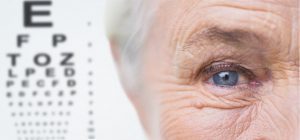Elmquist Eye Group Offers Tips for Healthy Aging Month
 Your vision is one of the first senses you may notice changing as you get older. Over time, many find a need for more light, have difficulty reading and doing close work, and experience problems with glare and tear production.
Your vision is one of the first senses you may notice changing as you get older. Over time, many find a need for more light, have difficulty reading and doing close work, and experience problems with glare and tear production.
“The effects of aging are not limited to wrinkles and gray hairs,” said Dr. Sarah Eccles-Brown, board-certified ophthalmologist and partner at Elmquist Eye Group. “Changes in eyesight are also common as we grow older, often leading to eye conditions including cataracts, glaucoma and age-related macular degeneration.”
The good news is that most normal age-related eye changes should not stop you from being active well into your golden years. Yet, you must begin caring for your eyes now in order to preserve your vision for years to come.
The most important thing you can do for your eyes is to get an annual eye exam, especially once you turn 40. That’s because the most common age-related vision conditions generally become evident between ages 41 to 60, including:
• Cataracts – Clouding of the normally clear lens of the eye, making things look blurry, hazy or less colorful.
• Age-related macular degeneration – The leading cause of irreversible vision loss among the elderly, causing loss of central vision.
• Glaucoma – A disease of the optic nerve, commonly associated with high eye pressures.
Regular comprehensive eye exams play a critical role in eye health, even if there are no noticeable vision problems. Exams allow your eye doctor to monitor, detect and treat developing eye conditions before permanent damage occurs.
“Early detection and diagnosis are most important in preventing loss of vision,” Eccles-Brown added. “In some cases, symptoms can be managed with lifestyle changes and medication. In more advanced cases, surgery may be necessary.”
Cataract surgery involves removing the eye’s natural lens, which has become cloudy and formed a cataract, and replacing it with an artificial lens implant. A variety of intraocular lenses are available
to correct your vision, ranging from traditional single vision to presbyopia-correcting lenses that can expand your range of clear vision with a reduced need for eyeglasses. Additionally, minimally invasive glaucoma procedures can also be performed in conjunction with cataract surgery, such as the iStent inject® and Kahook Dual Blade® to lower eye pressure.
While some vision changes may be subtle, there are also several cosmetic changes that come with age that can be affecting your vision.
Over time, the skin and muscles of your eyelids lose their elasticity and sag, resulting in impaired vision as they begin to block peripheral vision.
“For those plagued with undereye bags and droopy lids, an eyelid surgery called blepharoplasty can enhance the positioning of upper eyelids by removing loose skin and excess fat,” said Dr. Yasaira Rodriguez, an ophthalmologist for Elmquist Eye Group who specializes in cosmetic and surgical eye procedures. “This restores the eyelid’s natural contour while restoring peripheral vision.”
In addition to surgical options, non-surgical cosmetic procedures like dermal fillers and neurotoxins also offer a safe and effective way to reverse visible signs of aging. Cosmetic procedures can help improve the
appearance of fine lines and wrinkles, poor skin texture and lost facial volume. These procedures are minimally invasive with a short recovery time. An ophthalmologist specializing in these procedures can help you determine the best method of surgical or non-surgical treatment for your individual needs.
And while you can’t stop the aging process, you can take additional steps now (and throughout your life) to protect your vision:
• Have an annual comprehensive dilated eye exam
• Don’t smoke
• Exercise
• Maintain normal blood pressure
• Manage diabetes
• Limit UV exposure. Wear sunglasses and a brimmed hat any time you are outside in bright sunshine.
• Eat a diet rich in green, leafy vegetables and fish.
• Wear protective eyewear when working around your house or playing sports.
We must take a proactive approach to our vision as we advance in years. Make an appointment with your eye doctor today.
With more than 25 years of service to the Southwest Florida community, Elmquist Eye Group offers experienced doctors who are dedicated to patient care. Dr. E. Trevor Elmquist, Dr. Kate Wagner, Dr. Sarah Eccles-Brown, Dr. Nina Burt and Dr. Yasaira Rodriguez of Elmquist Eye Group are available to answer your questions. With three U.S. military veterans leading the practice, Elmquist Eye Group’s team stands ready to serve you right here in Southwest Florida. For more information, visit www.Elmquist.com, call 239-936-2020 or stop by an Optical Boutique location in Fort Myers or Cape Coral.
Elmquist Eye Group
239-936-2020 | www.elmquist.com
FORT MYERS
7970 Summerlin Lakes Dr.
CAPE CORAL
2336 Surfside Blvd., Suite 121










